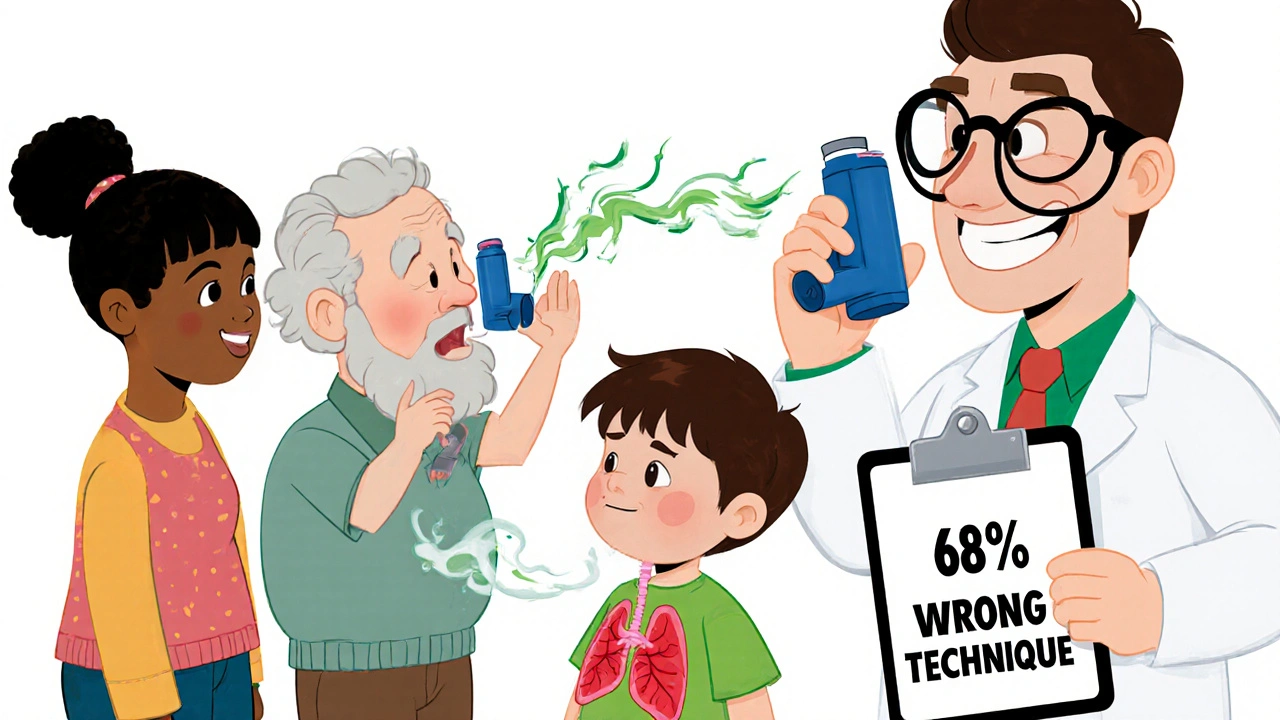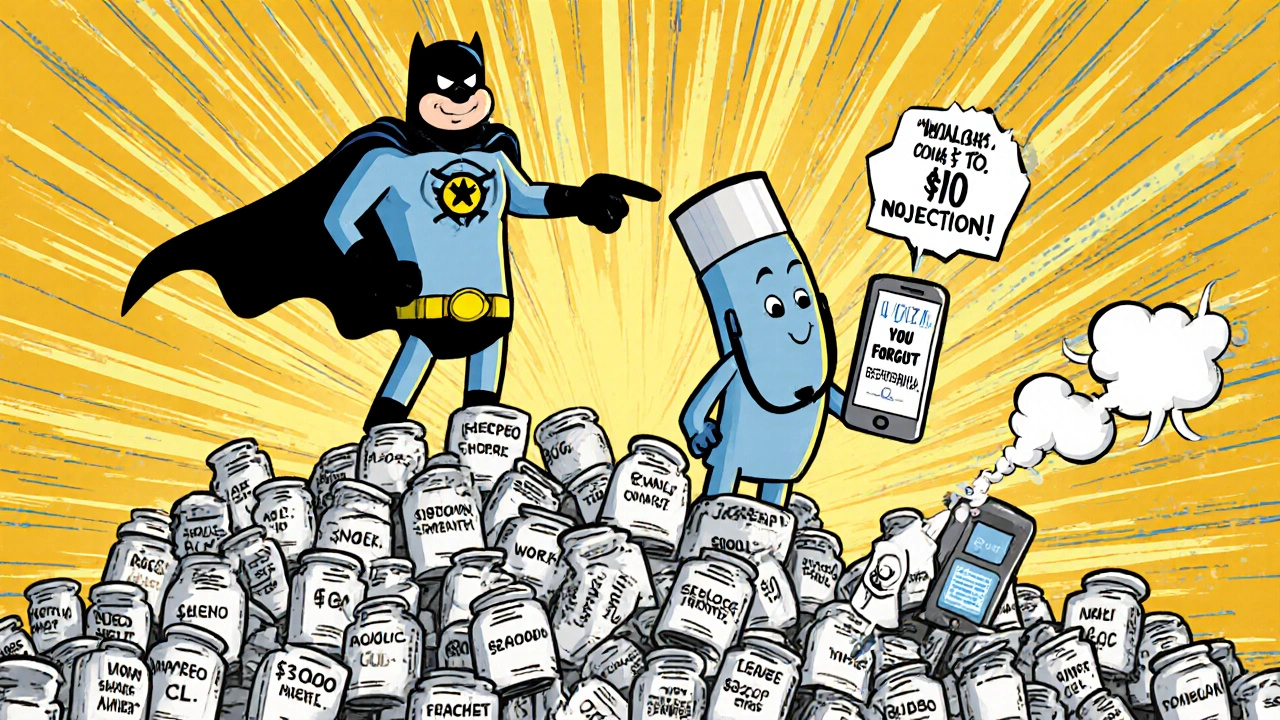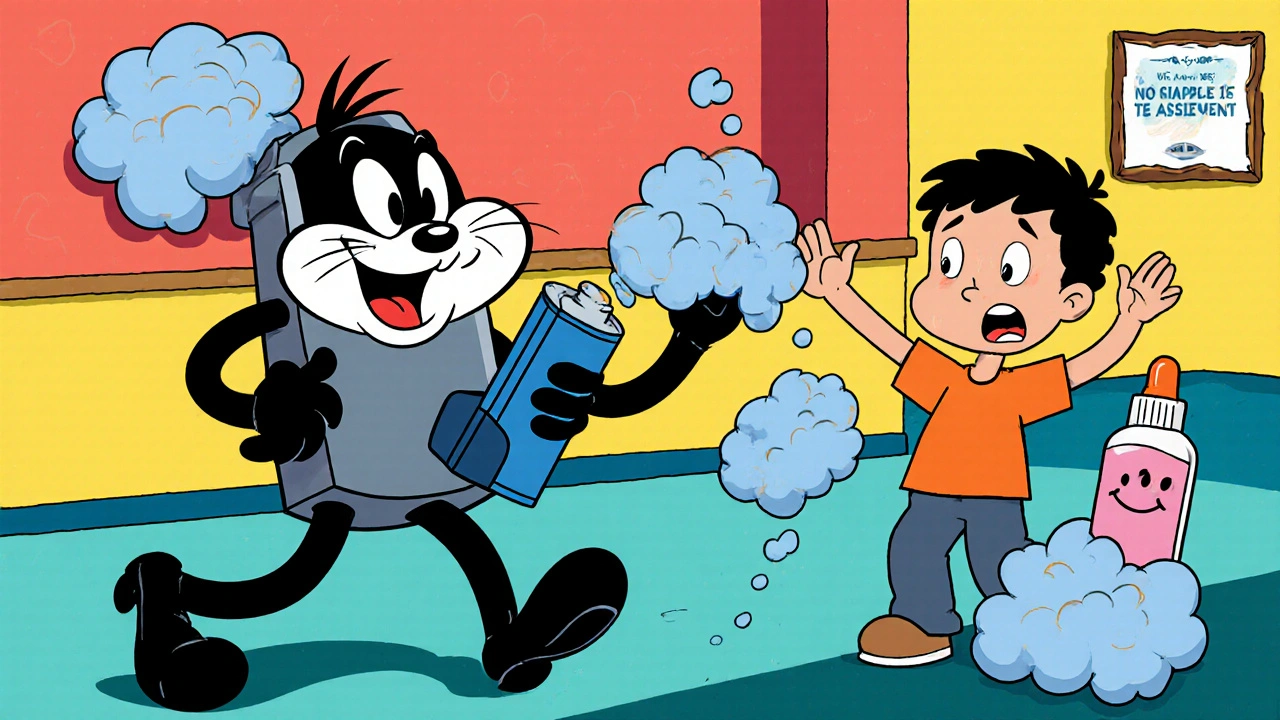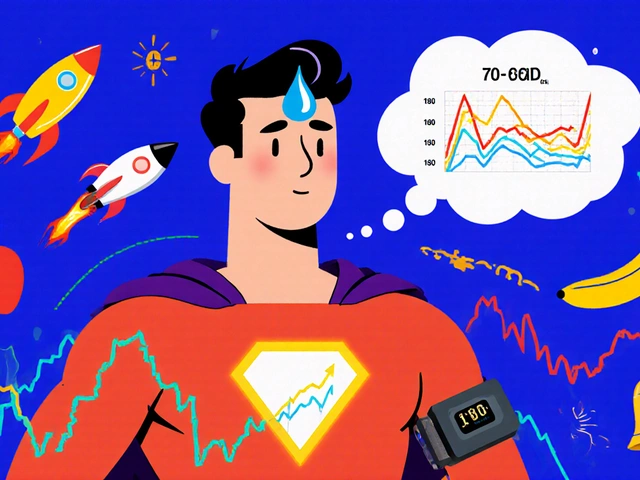Beclomethasone has been a quiet workhorse in asthma and allergy care for over 40 years. It’s not flashy like newer biologics, and you won’t see ads for it on TV. But if you’ve used an inhaler for asthma or chronic nasal allergies, chances are you’ve used beclomethasone-or someone close to you has. It’s cheap, effective, and has decades of real-world data backing it up. Now, as medicine pushes toward precision and personalization, beclomethasone isn’t being replaced. It’s being reimagined.
What Beclomethasone Actually Does
Beclomethasone is an inhaled corticosteroid (ICS). That means it’s a synthetic version of cortisol, your body’s natural anti-inflammatory hormone. When you inhale it, the drug lands directly on the lining of your airways. There, it turns down the immune system’s overreaction-reducing swelling, mucus, and sensitivity that cause wheezing, coughing, and breathlessness.
Unlike rescue inhalers like albuterol that open airways fast, beclomethasone works slowly. It doesn’t stop an attack in progress. But if you use it every day, it prevents attacks from happening in the first place. Studies show it reduces asthma exacerbations by 40-60% in adults and children when taken consistently.
It’s also approved for allergic rhinitis in nasal spray form. People with year-round allergies to dust mites, mold, or pet dander often use it daily to keep nasal congestion, sneezing, and postnasal drip under control. In fact, the American Academy of Allergy, Asthma & Immunology lists inhaled and intranasal corticosteroids as first-line therapy for persistent symptoms.
Why It’s Still Around When New Drugs Exist
Since 2010, we’ve seen a flood of new asthma drugs: biologics like omalizumab, mepolizumab, dupilumab. They target specific immune cells, work wonders for severe asthma, and cost over $3,000 a month. So why hasn’t beclomethasone disappeared?
Because most people with asthma don’t have severe disease. About 80% of asthma patients have mild to moderate symptoms. For them, beclomethasone still works better than anything else when you factor in cost, safety, and effectiveness.
A 2024 analysis of over 120,000 U.S. asthma patients found that those on low-dose beclomethasone had fewer ER visits and hospitalizations than those on newer, pricier alternatives-when used correctly. The kicker? Beclomethasone costs under $10 a month at most pharmacies. Biologics? Insurance often denies them unless you’ve tried and failed on ICS like beclomethasone first.
It’s not about being old. It’s about being right for the majority.
How Beclomethasone Is Changing
Beclomethasone isn’t standing still. The biggest shift? Delivery systems.
Older inhalers used chlorofluorocarbons (CFCs) as propellants. Those were banned globally in 2010 because they damaged the ozone layer. The replacement-hydrofluoroalkane (HFA)-wasn’t just an environmental fix. It changed how the drug behaves in your lungs.
Modern HFA inhalers deliver smaller, more consistent particles. That means more drug reaches the small airways where inflammation starts, and less sticks to your throat. Less throat irritation. Fewer yeast infections (oral thrush). Better results.
Now, new devices are emerging. Breath-actuated inhalers don’t require perfect hand-breath coordination. They fire automatically when you inhale. That’s huge for kids, elderly patients, or anyone with shaky hands. One 2023 trial showed that children using a breath-actuated beclomethasone inhaler improved their adherence by 37% compared to standard pressurized inhalers.
There’s also progress in combination inhalers. Beclomethasone is now paired with formoterol (a long-acting bronchodilator) in single devices like Qvar RediHaler. This simplifies treatment. One puff instead of two. Fewer mistakes. Better control.

Who Benefits Most Today?
Beclomethasone isn’t for everyone. But for these groups, it’s still the gold standard:
- Children with persistent asthma: Guidelines from the Global Initiative for Asthma (GINA) recommend low-dose ICS like beclomethasone as the first controller for kids over 5. It’s safe, effective, and doesn’t stunt growth when used properly.
- Low-income and uninsured patients: In places without universal healthcare, cost matters. Beclomethasone is often the only affordable long-term option.
- Patients with mild-to-moderate allergic rhinitis: Nasal beclomethasone reduces symptoms as well as oral antihistamines-but without drowsiness or dry mouth.
- People who prefer non-biologic therapy: Some patients don’t want injections or infusions. For them, a daily inhaler feels more manageable.
It’s not ideal for severe asthma with eosinophilic inflammation-that’s where biologics shine. But for the vast majority, beclomethasone delivers more value per dollar than any newer option.
Pitfalls and How to Avoid Them
Even the best drug fails if used wrong. Here are the most common mistakes with beclomethasone-and how to fix them:
- Not rinsing after use: Leaving residue in your mouth causes thrush. Always rinse with water and spit. Don’t swallow.
- Skipping doses: It takes 1-4 weeks to build up full effect. People stop because they don’t feel immediate relief. That’s like stopping a vitamin because you didn’t feel energized after one pill.
- Using it during an attack: Beclomethasone won’t help when you’re gasping. Keep a rescue inhaler (albuterol) on hand.
- Using the wrong technique: If you press the inhaler and breathe in too fast, most of the drug hits your throat. Watch a video from the manufacturer. Practice in front of a mirror.
Many patients don’t know how to use their inhaler. A 2024 study found that 68% of adults and 75% of children used their inhaler incorrectly. That’s why doctors now ask patients to demonstrate their technique at every visit.

What’s Next for Beclomethasone?
The future isn’t about replacing beclomethasone. It’s about making it smarter.
Smart inhalers with built-in sensors are already on the market. They track when and how you use your inhaler, then send data to your phone or doctor’s app. If you haven’t used it in three days, you get a gentle reminder. If you’re using it too often, it flags potential overuse-signaling your asthma is getting worse.
Researchers are also testing lower doses. A 2025 clinical trial showed that half the standard dose of beclomethasone (40 mcg twice daily) worked just as well as 80 mcg in mild asthma patients-with fewer side effects. That could mean even safer long-term use.
And in the lab, scientists are exploring beclomethasone derivatives that target airway inflammation more precisely-reducing systemic absorption even further. Early animal studies show promise for fewer bone density or metabolic side effects.
Beclomethasone won’t cure asthma. But it’s becoming a smarter, safer, more connected tool in the hands of patients who need it most.
Final Thought: The Quiet Hero
In a world obsessed with breakthroughs, beclomethasone reminds us that sometimes, the best medicine isn’t the newest one. It’s the one that works, costs little, and has stood the test of time. For millions, it’s not just a drug-it’s a lifeline. And as long as asthma and allergies exist, beclomethasone will still be there, quietly doing its job.
Is beclomethasone safe for long-term use in children?
Yes, when used at the lowest effective dose. Long-term studies spanning over 20 years show that low-dose inhaled beclomethasone does not significantly affect final adult height in children. The risk of slowed growth is temporary and minimal-typically less than half a centimeter over several years. The benefit of preventing severe asthma attacks far outweighs this small risk. Always use a spacer and rinse after inhalation to reduce side effects.
Can I use beclomethasone nasal spray and inhaler at the same time?
Absolutely. Many people with both asthma and allergic rhinitis use both forms. The nasal spray targets the nose, the inhaler targets the lungs. Since the drugs are inhaled locally and not absorbed heavily into the bloodstream, using both together is safe and often recommended by allergists. Just rinse your mouth after the inhaler and avoid sniffing the spray deeply into your throat to minimize irritation.
How long does it take for beclomethasone to start working?
You won’t feel immediate relief. Beclomethasone reduces inflammation over time. Most people notice fewer symptoms after 1-2 weeks, but full effect can take 3-4 weeks. Don’t stop using it if you don’t feel better right away. Consistency is key-it’s a preventive medication, not a rescue one.
Does beclomethasone cause weight gain or osteoporosis?
At standard inhaled doses, the risk is very low. Unlike oral steroids, inhaled beclomethasone delivers the drug directly to the lungs with minimal absorption into the bloodstream. Weight gain and bone loss are rare unless you’re on very high doses for years or have other risk factors like smoking or low vitamin D. Regular monitoring and using the lowest effective dose keep these risks minimal.
What’s the difference between beclomethasone and fluticasone?
Both are inhaled corticosteroids, but they’re chemically different. Fluticasone is slightly more potent per microgram, so lower doses are often used. Beclomethasone has a longer safety track record in children and is often cheaper. Some patients respond better to one than the other. If one doesn’t work well or causes side effects, switching to the other is common and often effective.





Billy Tiger
October 31, 2025 AT 14:13Beclomethasone is a relic and we should be ashamed we’re still using it in 2025 when we have biologics that actually work
Alex Sherman
November 1, 2025 AT 03:17You people don’t understand medicine. If you can’t afford a $3,000/month biologic, maybe you shouldn’t be on the healthcare system at all. Beclomethasone is for the poor who can’t handle real treatment.
Oliver Myers
November 2, 2025 AT 18:31I just want to say thank you for writing this. My daughter’s asthma improved so much after switching to a breath-actuated beclomethasone inhaler. We used to go to the ER every month. Now? Zero visits in 14 months. It’s not glamorous, but it saved our lives.
And yes, we rinse every time. Always. No thrush. No drama. Just peace.
Joseph Kiser
November 2, 2025 AT 22:13Man, I love this post. Seriously. Beclomethasone is like that one friend who never shows up to parties but shows up when you’re crying at 3am. No fanfare. No selfies. Just there.
And those smart inhalers? Genius. My grandma’s new one texts her if she misses a dose. She thinks it’s a robot butler. It’s beautiful.
Katie Ring
November 3, 2025 AT 08:02It’s not about cost. It’s about control. Beclomethasone is the last bastion of real medicine before we hand everything over to corporate biologics and insurance gatekeepers. This isn’t nostalgia. It’s resistance.
Keerthi Kumar
November 4, 2025 AT 05:39As someone from India, where inhalers cost more than a week’s groceries for many… beclomethasone isn’t just medicine-it’s dignity. My cousin’s son used to cough all night. Now? He plays cricket. With a spacer. And rinses. And smiles.
Don’t call it old. Call it equitable. Call it justice. Call it what it is: a quiet revolution in a plastic canister.
Ajay Kumar
November 5, 2025 AT 13:09Actually, you’re all missing the point. Beclomethasone is being replaced-not by biologics, but by AI-driven predictive inhalers that use machine learning to anticipate bronchoconstriction before it happens, based on ambient air quality, pollen count, and your heart rate variability. The FDA just greenlit Phase 3 trials last month. Beclomethasone is just the payload. The real innovation is the delivery system’s neural network. You’re all stuck in 2010 thinking about drugs when the future is in data streams and predictive analytics. Also, the nasal spray version was banned in Japan in 2022 due to trace fluorine contamination, but nobody talks about that because Big Pharma owns the narrative. So yes, beclomethasone is still here-but not for the reasons you think.
Eileen Choudhury
November 6, 2025 AT 16:35OMG YES. I’ve been using beclomethasone for 12 years. I used to think I was broken because I didn’t need fancy stuff. But now I feel like a superhero. Low cost. No injections. Just me, my inhaler, and my morning coffee. 🌞✨
Also, if you’re not using a spacer with your kid? Please. Just stop. It’s like trying to drink soup with a fork.
Alexa Apeli
November 7, 2025 AT 15:42While I appreciate the sentiment expressed herein, I must respectfully assert that the continued utilization of beclomethasone, albeit efficacious, represents a suboptimal allocation of therapeutic resources in the context of contemporary pulmonary medicine. The pharmacoeconomic model presented, while superficially compelling, fails to account for long-term systemic morbidity and the opportunity cost of delaying targeted biologic intervention in subpopulations with latent eosinophilic phenotypes. Furthermore, the assertion of safety in pediatric populations warrants re-evaluation in light of recent longitudinal cohort analyses published in The Lancet Respiratory Medicine, 2024.
Adarsha Foundation
November 7, 2025 AT 19:55I just wanted to say… thank you for this. I’m from Kerala. My mom used to use beclomethasone for her allergies. She’s 72. Still uses it. No problems. No drama. Just quiet relief.
People here don’t talk about it much. But we know. It’s not about being modern. It’s about being kind.
Marcia Facundo
November 8, 2025 AT 17:28My therapist says I’m obsessed with my inhaler. Maybe I am. But when I can breathe, I can sleep. And when I sleep, I don’t cry. So yeah. I’ll take my $8 inhaler over your $3,000 biologic any day. It’s not about the drug. It’s about the silence it gives me.
Mike Laska
November 10, 2025 AT 04:49I used to think beclomethasone was boring. Then my kid had his first asthma attack at 3am. We didn’t have insurance. We had one inhaler. One. And it worked. Not perfectly. Not fast. But it worked.
Now I cry every time I see a kid using it. Not because it’s magic. But because it’s enough. And sometimes… enough is everything.
Hazel Wolstenholme
November 11, 2025 AT 09:09How quaint. We’ve moved from the Industrial Age to the Bio-Technological Renaissance, yet we still revere a 1970s corticosteroid as if it were a sacred relic. This is not medicine-it’s cultural nostalgia dressed in pharmaceutical garb. The real tragedy isn’t the cost of biologics-it’s the collective refusal to evolve. Beclomethasone is the medical equivalent of a rotary phone. Adorable. Useless.
Roy Scorer
November 11, 2025 AT 09:11Look. I’ve been on biologics for 7 years. I’m alive. I’m breathing. I’m not poor. But I still keep my beclomethasone inhaler in my drawer. Why? Because one day, my insurance will drop me. One day, my job will vanish. One day, I’ll be the person who can’t afford $3,000. And when that day comes? I’ll be glad I didn’t forget the quiet hero.